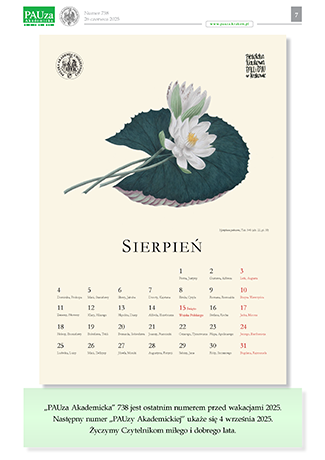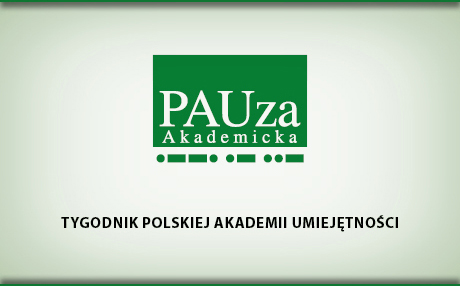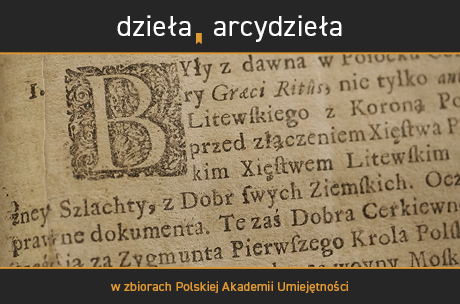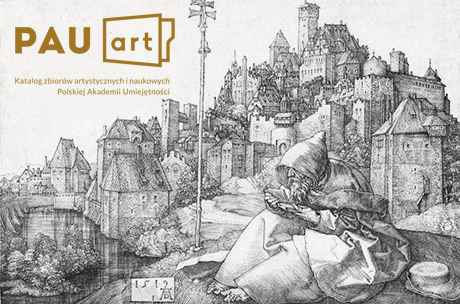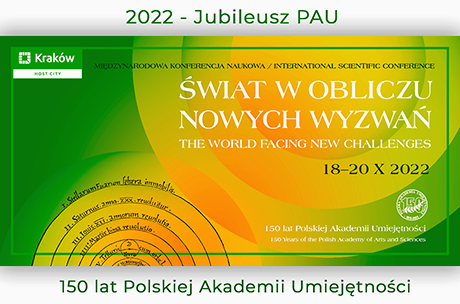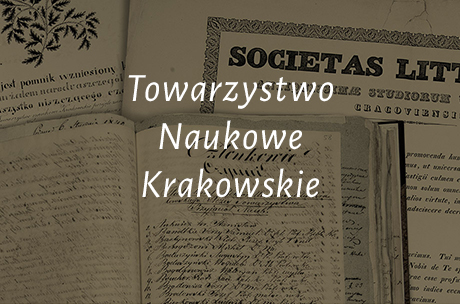Peer Reviewers
Peer Reviewers
Peer Reviewers of the volumes: XI (2012) — 15 (2016)
The Editorial Committee of the journal would like to thank all the Peer Reviewers below mentioned for taking the time to assess the works to be published in our yearbook.
- prof. dr hab. Stefan Witold Alexandrowicz (retired worker, Akademia Górniczo-Hutnicza; Kraków, Poland);
- prof. dr hab. Andrzej Banach (Zakład Historii Oświaty i Kultury, Instytut Historii, Wydział Historyczny, Uniwersytet Jagielloński; Kraków, Poland);
- dr Maria Baster-Grząślewicz (retired worker, Instytut Fizyki, Wydział Matematyczno-Fizyczno-Techniczny, Uniwersytet Pedagogiczny; Kraków, Poland);
- dr hab. Maria Magdalena Blombergowa (retired worker, Instytut Archeologii, Wydział Filozoficzno-Historyczny, Uniwersytet Łódzki; Łódź, Poland);
- prof. dr hab. Wiesław Caban (Instytut Historii, Wydział Humanistyczny, Uniwersytet Jana Kochanowskiego w Kielcach; Kielce, Poland);
- dr Piotr Cybula (Zakład Prawa, Wydział Turystyki i Rekreacji, Akademia Wychowania Fizycznego w Krakowie, Kraków, Poland);
- dr hab. Adam Dobroński, prof. nadzw. (Instytut Historii i Nauk Politycznych, Wydział Historyczno-Socjologiczny, Uniwersytet w Białymstoku; Białystok, Poland);
- dr hab. Stanisław Domoradzki, prof. nadzw. (Wydział Matematyczno-Przyrodniczy Uniwersytetu Rzeszowskiego; Rzeszów, Poland);
- prof. dr hab. Roman Duda (retired worker, Instytut Matematyczny, Uniwersytet Wrocławski; Wrocław, Poland);
- prof. dr hab. Julian Dybiec (retired worker, Instytut Historii, Wydział Historyczny, Uniwersytet Jagielloński; Kraków, Poland);
- dr hab. Piotr Flin, prof. nadzw. (retired worker, Instytut Fizyki, Uniwersytet Jana Kochanowskiego; Kielce, Poland);
- prof. dr hab. Ludwik Frey (retired worker, Instytut Botaniki im. Władysława Szafera Polskiej Akademii Nauk; Kraków, Poland);
- prof. dr hab. Stanisław Grodziski (retired worker, Katedra Historii Prawa Polskiego, Wydział Prawa i Administracji, Uniwersytet Jagielloński; Kraków, Poland);
- Prof. Andreas Kleinert, Ph. D. (retired worker, Martin-Luther-Universität Halle-Wittenberg, Institut für Physik; Halle, Germany);
- prof. dr hab. Michał Kokowski (Instytut Historii Nauki im. L. i A. Birkenmajerów PAN; Warsaw, Poland);
- dr hab. Władysław Marek Kolasa (Instytut Nauk o Informacji, Wydział Filologiczny, Uniwersytet Pedagogiczny w Krakowie; Kraków, Poland);
- prof. dr hab. Jerzy Kreiner (retired worker, Instytut Fizyki, Wydział Matematyczno-Fizyczno-Techniczny, Uniwersytet Pedagogiczny w Krakowie; Kraków, Poland);
- dr hab. Krzysztof Maślanka, prof. PAN (Instytut Historii Nauki im. L. i A. Birkenmajerów PAN; Warsaw, Poland);
- ks. dr hab. Janusz Mączka, prof. UPJPII (Katedra Filozofii Przyrody, Wydział Filozoficzny, Uniwersytet Papieski im. Jana Pawła II; Kraków, Poland);
- dr Jan Mietelski (Obserwatorium Astronomiczne Uniwersytetu Jagiellońskiego; Kraków, Poland);
- dr Magdalena Mularczyk (Ogród Botaniczny we Wrocławiu; Wrocław, Poland);
- prof. dr hab. Wojciech Narębski (retired worker, Muzeum Ziemi PAN; Warsaw, Poland);
- dr hab. Zbigniew Osiński, prof. nadzw. (Zakład Informatologii, Instytut Informacji Naukowej i Bibliotekoznawstwa, Wydział Humanistyczny, Uniwersytet Marii Curie-Skłodowskiej; Lublin, Poland);
- prof. dr hab. Tomasz Placek (Zakład Epistemologii, Instytut Filozofii, Wydział Filozoficzny, Uniwersytet Jagielloński; Kraków, Poland);
- dr Zdzisław Pogoda (Zakład Historii Matematyki, Uniwersytet Jagielloński; Kraków, Poland);
- dr hab. Paweł Polak (Katedra Filozofii Przyrody, Wydział Filozoficzny, Uniwersytet Papieski Jana Pawła II; Kraków, Poland);
- Prof. Józef Przytycki, Ph. D. (Department of mathematics, Columbian College of Arts and Sciences; Washington, USA);
- dr Tomasz Pudłocki (Instytut Historii, Wydział Historyczny, Uniwersytet Jagielloński; Kraków, Poland);
- dr Jerzy Raciborski (Zakład Prawa, Wydział Turystyki i Rekreacji, Akademia Wychowania Fizycznego w Krakowie; Kraków, Poland);
- dr Alicja Rafalska-Łasocha (Zakład Chemii Nieorganicznej Wydziału Chemii UJ Uniwersytetu Jagiellońskiego; Kraków, Poland);
- dr hab. Inż. Lucyna Rajchel (Katedra Geologii Złożowej i Górniczej, Wydział Geologii, Geofizyki i Ochrony Środowiska, Akademia Górniczo-Hutnicza; Kraków, Poland);
- dr hab. Jacek Rodzeń (Instytut Bibliotekoznawstwa i Dziennikarstwa, Uniwersytet Jana Kochanowskiego; Kielce, Poland);
- prof. dr hab. Waldemar Soszka (retired worker, Instytut Fizyki, Wydział Matematyczno-Fizyczno-Techniczny, Uniwersytet Pedagogicznego; Kraków, Poland);
- Prof. Margaret Stawiska-Friedland, Ph. D. (Mathematical Reviews / MathSciNet, American Mathematical Society, Ann Arbor, MI, USA);
- Prof. Roman Sznajder, Ph. D. (Department of Mathematics, Bowie State University, Bowie, MD 20715, USA);
- prof. dr hab. Karolina Targosz (retired worker,., Instytut Historii Nauki im. L. i A. Birkenmajerów PAN; Warsaw – Kraków, Poland);
- dr hab. Andrzej J. Wójcik, prof. PAN (Instytut Historii Nauki im. L. i A. Birkenmajerów PAN; Warsaw, Poland);
- prof. dr hab. Zbigniew Wójcik (retired worker, Muzeum Ziemi Polskiej Akademii Nauk; Warsaw, Poland);
- prof. dr hab. Henryk Żaliński (retired worker, Instytut Historii, Wydział Humanistyczny, Uniwersytet Pedagogicszny; Kraków, Poland).
Editorial Office Contact Information
Editorial Office Contact Information
Studia Historiae Scientiarum
ul. Sławkowska 17, 31-016 Kraków, POLAND
Phone (+48) 12 424 02 02
This email address is being protected from spambots. You need JavaScript enabled to view it.
Note
E-mails regarding reviews of articles should also be addressed to:
This email address is being protected from spambots. You need JavaScript enabled to view it.
The Scientific Council
The Scientific Council
- Prof. Stefan Witold Alexandrowicz, Habilitated Doctor (retired worker, AGH University of Science and Technology; Kraków, Poland)
-
Prof. Fabio Bevilaqua Ph.D. (emeritus professor, Dipartimento di Fisica „A. Volta”, Università di Pavia; Pavia, Italy);
- Prof. Dr. Karine Chemla (Centre National de la Recherche Scientifique, SPHERE Research Unit, Université Paris Diderot; Paris, France)
- Prof. Robert Fox, Ph.D. (emeritus professor, Museum of the History of Science, Oxford University; Royal Society; Oxford, United Kingdom)
- Prof. Dr. Robert Halleux (Centre d’Histoire des Sciences et des Techniques, University of Liège; Liège, Belgium)
- Prof. Dr. Eberhard Knobloch (Institut für Philosophie, Literatur-, Wissenschafts- und Technikgeschichte, Technische Universität Berlin; Berlin, Germany)
- Prof. Helge Kragh, Ph.D. (emeritus professor, The Niels Bohr Institute, University of Copenhagen; Copenhagen, Denmark)
- Prof. Efthymios Nicolaidis, Ph.D. (National Hellenic Research Foundation, Institute for Neohellenic Research, Hellenic Society for the History, Philosophy and Didactics of Science; Athens, Greece)
-
Raffaele Pisano, Ph.D., HDR (University of Lille 1, L’Unité de Formation et de Recherche en Physique; Lille, France)
- Doc. Dr. Soňa Štrbáňová (Centre for the History of Sciences and Humanities, Institute for Contemporary History, Academy of Sciences of Czech Republic; Prague, Czech Republic)
- Prof. Jan Woleński, Habilitated Doctor (retired worker, Institute of Philosophy, Jagiellonian University; Kraków, Poland)
- Prof. Andrzej Kajetan Wróblewski, Habilitated Doctor (retired worker, Institute of Physics, University of Warsaw; Warsaw, Poland)
- Prof. Jerzy Wyrozumski, Habilitated Doctor (retired worker, Institute of History, Jagiellonian University; Kraków, Poland)
The Editorial Committee
The Editorial Committee
- Editor-in-Chief:
Prof. Michał Kokowski, habilitated doctor (L. and A. Birkenmajer Institute of the History of Science, Polish Academy of Sciences; Warsaw – Kraków, Poland) - Deputy Editor-in-Chief:
Prof. Jerzy Kreiner, habilitated doctor (emeritus professor, Institute of Physics, Pedagogical University of Kraków; Kraków, Poland) - Statistical Editor:
Dr. Alicja Rafalska-Łasocha (Department of Inorganic Chemistry, Faculty of Chemistry, Jagiellonian University; Kraków, Poland)
- Advisory Editors:
- prof. Jan Golinski, PhD (University of New Hampshire, College of Liberal Arts, Department of History (Durham, Great Britain)
- Raffaele Pisano, Ph.D., HDR (University of Lille 1, L’Unité de Formation et de Recherche en Physique; Lille, France)
- dr. Jan Surman (Leibniz Graduate School “History, Knowledge, Media in East Central Europe” Herder Institute for Historical Research on East Central Europe; Marburg, Germany)
- Linguistic Editor (Polish):
Edyta Podolska-Frej (Publishing Section, Polish Academy of Arts and Sciences; Kraków, Poland) - Linguistic Editor (English):
Filip Klepacki
About the journal
Studia Historiae Scientiarum
ISSN: 2451-3202 (the printed version)
ISSN: 2543-702X (the electronic version)
PREVIOUS TITLE OF THE JOURNAL:
Prace Komisji Historii Nauki PAU (Proceedings of the PAU Commission on the History of Science)
NOTE:
Website: http://pau.krakow.pl/index.php/pl/wydawnictwo/strony-czasopism/prace-komisji-historii-nauki-pau/
is the archival page of the journal
The current information about the journal is available at
![]()
First peer-reviewed, open access journal in Poland devoted to the history of science
Frequency of publication, the history and future of the journal
The journal has been published annually since 1999. It had been published in a printed (paper) form until 2012 and since 2013 it has been published in an electronic form and in print (paper).
Until 2015 the journal has been published under the name Prace Komisji Historii Nauki PAU (in print – ISSN: 1731-6715 and, since 2013, an electronic form – ISSN: 2392-1749).
The historical predecessor of this journal were Prace Komisji Medycyny i Nauk Matematyczno-Przyrodniczych Polskiej Akademii Umiejętności (Proceedings of the Commission of the History of Medicine and Mathematical and Natural Sciences of the Polish Academy of Arts and Sciences), which were irregularly published in 1939 (vol. 1), 1949 (vols. 2, 3.1, 3.2), 1950 (vol. 3.3), 1952 (vols 4.1, 4.2) and 1953 (vol. 4.3) [published after the activity of the Academy had been suspended].
Note:
Following the decision of the Department of Science of the Ministry of Science and Higher Education of the Republic of Poland, reference number SJN.5040.89.2016 of May 20, 2016, "The Proceedings of the PAU Commission on the History of Science" has ultimately received 9 points, instead of 8 points originally granted on December 23, 2015 ― cf. Część B Wykazu Czasopism (Part B of the List of Journals), no. 1283.
Under the court decision dated July 4, 2016, the name of the journal was changed to: Studia Historiae Scientiarum.
The journal under a new name will retain scores awarded the journal under the old name ― see: the mail correspondence (in Polish) on this issue with the Ministry of Science and Higher Education from 5-7 January 2016 (pdf).
Versions of the journal
The journal is available electronically and in print (ISSN: 2451-3202).
It is issued under non-exclusive Creative Commons licence (BY-NC-ND 3.0) – cf. bookmark: Copyright and fair use.
Since 2013 the electronic version of the journal, available online, has become the official source to be used for reference
(http://pau.krakow.pl/Studia-Historiae-Scientiarum/).
Since 2017 individual texts of the journal will appear on the new website
(http://www.ejournals.eu/Studia-Historiae-Scientiarum)
in the so-called online mode, that is immediately after reviewing and editing is completed.
The final numbering of all texts will be introduced at the end of each year and only then the final version of the yearbook will be published on both the old and the new webpage.
The printed version can be ordered from Dział Wydawnictw Polskiej Akademii Umiejętności (Division of Publications of the Polish Academy of Arts and Sciences) (31-016 Kraków ul. Slawkowska 17; Phone +48 12 424 02 12; E-mail: This email address is being protected from spambots. You need JavaScript enabled to view it.).
(Both versions of the journal contain an identical list and the contents of scientific articles.)
The scope of the journal
The publications of the journal concern the following:
(a) general history of science and its relationships with other domains of culture (philosophy, religion, art and technology) and other meta-sciences (philosophy of science, sociology of the scientific knowledge, scientometrics etc.);
(b) history of specific disciplines (scientific theories, world views, scholars and scientific institutions);
(c) history of scientific institutions researching the history of science;
(d) methodology and teaching of the history of science.
Particular importance is placed on:
(a) the Polish contribution to science;
(b) mutual interactions of the Polish science and the foreign science;
(c) international collaboration regarding the history of science;
(d) open science regarding the history of science (including digital libraries) both on a national and international level;
(e) critical appraisal of bibliometrics in the light of the history of science.
The sections of the journal
(a) Editorial
(b) Research papers and brief communications or research notes (on sources, conceptual or surveys) concerning:
(b.1) Origins, contents and the reception of scientific “products”, e.g. theories or scientific instruments
(b.2) Scholars and institutions
(b.3) Tools and techniques for research in the history of science
(b.4) Teaching the history of science
(c) Presentations and reviews
(d) Discussions and polemics
(e) News and conference reports
(f) Varia (among others: interviews, recollections, translations, reprints)
(g) Letters to the Editor
(h) Report on the activity of the PAU Commission on the History of Science
(i) In memoriam.
Note:
A brief communication or a research note is a short research article intended to present, in a synthetic way, an important issue. Brief Communications or research notes are limited to 2,000 words, including bibliography, and to 6 pages, including illustrations.
The language of the publications
Until 2014 Polish had been the language of the publication. Additionally, since 2010, abstracts of the articles have been published in English. Since 2015, Polish and the so-called congress languages are fully eligible languages of the publications (English preferred). Since 2016, Polish and English are fully eligible languages of the publications (other languages are permissible in exceptional and duly justified cases).
© Michał Kokowski, Prace Komisji Historii Nauki PAU







